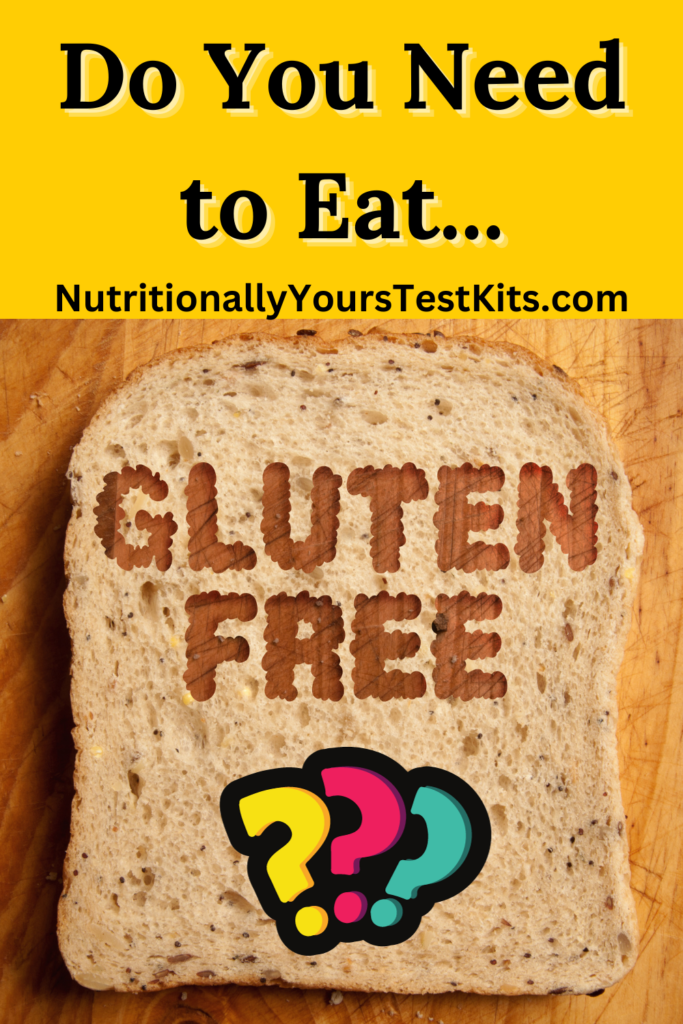There is plenty of science-based evidence to suggest that a gluten-free diet may be beneficial for some people. There have been many studies showing that gluten protein does not only affect people with celiac disease.
If you are asking the question is gluten bad for you, it depends on if you have any of these symptoms of health challenges.
Is gluten bad for you if you have any of the symptoms mentioned above? Most likely, it is.

A gluten intolerance can feel like a number of symptoms. One major way I feel a gluten intolerance is that my whole body feels like it is under an attack. Some other symptoms people feel are autoimmunity, skin eruptions, pain, fatigue, brain fog, IBS, diarrhea, constipation, mood swings, confusion, depression, weight gain and more.
One of the most dramatic cases I had was a lady that called me from the hospital. Her colon was severely inflamed and the doctor suggested on a full colon removal to improve her disturbing gut health symptoms. When she and her family consulted with me they did ask if gluten is bad for you and if removing gluten from her diet may save her colon?
They left the hospital, knowing she could always get her colon out but wanted to wait till after we met to make a final decision. She still had some hope. I ran a comprehensive test for gluten and it was positive for gluten intolerance.
We removed gluten from her diet and within a few days her gut health dramatically improved and she felt better. She never needed to have her colon removed.
Another way to describe what a gluten intolerance feels like is that our brain feels like it is being attacked. I remember being out to dinner with another couple, and the evening started great. We ordered dinner, and over time, the other couple’s voices began to sound louder and louder. Then the room started to spin, and I was getting a migraine. I looked down at my food and saw noodles in my salad. I got glutened! I had to apologize to the other couple, leave early, and sleep it off.

One of the main benefits a gluten free diet provides for your health is pretty simple. By eliminating this sticky, glue-like substance from your diet, you are enabling your body to work better for you overall.
Here is a list of health benefits of a gluten free diet:
You may be asking yourself how is gluten bad for you when we all grew up eating it?
When I was younger, I wish someone had taught me about gluten. The earlier years of my life would have been much healthier and more manageable.
When I was 10, the symptoms of irritable bowel syndrome started and were very bad. They disrupted my life. I was afraid to go out to eat with friends, fearing my stomach would get upset. I would go days without eating when I had a social event.
My medical doctor tried to help me with medications and testing, but nothing worked. In the 1980s, diet was not discussed, so we had no idea what the cause was.
When I was 35 years old, I was sitting in a class on autoimmunity, and everything clicked. It was like a light bulb went on bright for me. I tested myself for gluten intolerance, and not only was it positive, but the Celiac markers were also positive. No wonder my stomach was messed up.
Since eating a gluten-free diet, the health benefits have been many. They include better sleep, no more acne, healthier hair, reduced pain, no upset stomach, fewer autoimmune attacks, and more.
 Many clients report that gluten has caused brain fog and mood swings. You may not find brain fog or mood problems on the list for celiac symptoms, but you will for non celiac gluten intolerance symptoms.
Many clients report that gluten has caused brain fog and mood swings. You may not find brain fog or mood problems on the list for celiac symptoms, but you will for non celiac gluten intolerance symptoms.
“Brain fog may be even more common in those with non-celiac gluten sensitivity than in those with celiac disease: Dr. Alessio Fasano, director of the Massachusetts General Hospital Center for Celiac Research, said in an interview with Verywell.com that brain fog affects about one-third of his gluten sensitivity patients.”
The bottom line is this,
If you’ve ever asked yourself is gluten bad for you and causing cognitive and mood problems, the answer is most likely yes.
Gluten affects all of us as it makes the gut lining permeable.
This means the food particles and proteins that need to stay in the gut do not. They move out of your stomach and move into your bloodstream, causing adverse symptoms and reactions to your body, including your brain.
I am amazed at the number of clients stating that they can think clearer and have a balanced mood just from eliminating gluten from their diet.

I have been working in the field of holistic health and wellness for over 30 years. Nutritionally Yours has a functional medicine medical doctor on staff. Nutritionally Yours offers a wide variety of at-home blood test kits, nutrition test kits at, home health test kits, nutrition, naturopathic, metabolic and weight loss appointments Monday – Friday 9-4 EST.
Our goal and mission is to help our clients get to the root cause of health or weight loss struggles so you can feel healthier, confident, and accomplish more in life.
BOOK a virtual health and nutrition appointment today, so we can listen to your health concerns and guide you on the right path to feeling fantastic again.
Let’s get you feeling happier, healthier, confident, energized and feeling amazing.